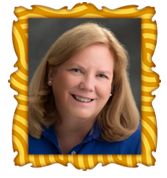Happy Friday!
Happy Independence Day too! July 4th was also my dad’s birthday. We used to kid that he was so important the whole country would stop and celebrate the day of his birth each year. My dad was my biggest cheerleader.
If you’ve struggled or are still struggling to find a publisher willing to take a risk on your work, you know how discouraging it can become. After several years of fruitless searching, everyone around starts to doubt there is any reason for you to continue. Sometimes the sentiment is in their expressions; sometimes it’s in their words. I had people point out the number of books I had published in the S & L market and suggest maybe I should stick with what I know. Not my dad, he never faltered in his support. My father encouraged me to hold onto my dream. He never spoke of it as an ‘if’, but rather as a when.
This brings me to – What’s in a name? I work on many kinds of projects in my ‘day’ job. Some of them are written under Lisa Cocca, some under Lisa M. Cocca, some without my name at all, and there are a few written under names I don’t even recall. (Some levelled reader companies don’t like to have too many titles listed under one author’s name. They’ll still hire the same writer to write them, but they request different names on the covers.) When I did my first S & L book, I hesitated in deciding what name to use. Then I decided to use both my maiden name (my father’s name) and my married name (my kids’ name). I hope this honors my father and my kids in some small way.
Like everything in life, this choice came with a few glitches. One being almost no one pronounces my maiden name correctly. I’ve even had people ask me how to pronounce it and then pronounce it incorrectly five minutes later when they introduce me. For me, it’s not really a big deal, but if it would bother you give this some thought when you choose what name to be published under.
One member of my critique group was considering using a penname drawn from her name. Another member recommended against it. She pointed out the possible pitfalls of using a penname, including things like being known as one name in one group of friends and another with a second group of friends or being paid for a school visit and having the check made out to your penname instead of your legal name. These are minor things that can be handled, but you need to ask yourself if you want to deal with them.
Still lots of writers use pennames. Some do it because they write across genres and age groups and don’t want someone who has read one genre to be surprised by another book they pick up under that author name. If you write adult erotica and then write a tween novel, you don’t want the twelve year old picking up your erotica hoping to read about another life-saving dog. Many years ago, I read a mystery series set on Wall Street written by a female author. I was intrigued by how well this woman wrote from the male perspective. The more books I read the more I wondered if she had worked on Wall Street. Her insight into the workings of the financial industry and the spot on male perspective must be coming from somewhere. I researched her name and discovered ‘she’ was a ‘he’ who indeed had experienced the world of finance. The author had researched the mystery market and learned most mysteries are purchased by women and women were more likely to buy a mystery written by a woman. Hence, he decided to use a female penname.
So what’s in the name you write under? Is it your legal name? A penname? Why did you choose to use that name?
Lisa
